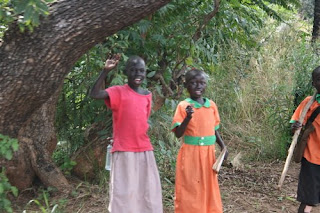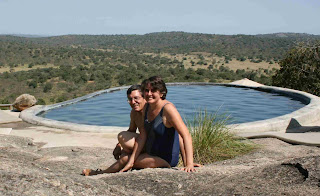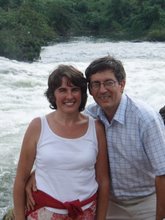 Surprised by misty blue mountains
Surprised by misty blue mountainsRelieved by sudden ghostly eddies of cool air –I emerge high above the Nile, enthralled.


Will someone love this land – answer its cry?


 Stephen Waldron
Stephen Waldron Surprised by misty blue mountains
Surprised by misty blue mountains



 Stephen Waldron
Stephen Waldron Time to talk about the job I do again instead of the pastimes and leisure pursuits! This blog will be about the building side of things. The picture adjacent shows how seriously I take my work!
Time to talk about the job I do again instead of the pastimes and leisure pursuits! This blog will be about the building side of things. The picture adjacent shows how seriously I take my work! independently run - like a real family. The site is based around a working farm, where we grow all the food for the children and mothers and are slowly moving towards a livestock component.
independently run - like a real family. The site is based around a working farm, where we grow all the food for the children and mothers and are slowly moving towards a livestock component. The whole site is a demonstration in sustainable design and construction, with an emphasis on water conservation. We utilise our own home made bricks (burnt), home made cookers (Lorena ‘Rocket’ stoves) and bio-sand filters to provide drinking water. Our toilets are Ecosan composting type and the waste products are used on the land. Each house has a solar hot water system and solar electric system; they have no water connection but rely 100% on rainwater harvesting. There are no ceilings and yet the houses are very cool (but noisy when it rains!!).
The whole site is a demonstration in sustainable design and construction, with an emphasis on water conservation. We utilise our own home made bricks (burnt), home made cookers (Lorena ‘Rocket’ stoves) and bio-sand filters to provide drinking water. Our toilets are Ecosan composting type and the waste products are used on the land. Each house has a solar hot water system and solar electric system; they have no water connection but rely 100% on rainwater harvesting. There are no ceilings and yet the houses are very cool (but noisy when it rains!!). Also on the site will be a farm, a school, and an admin block. The latter is a refurbishment and extension project and is nearing completion, having dramatically remodelled a set of shambolic buildings (if they could be described as that) into a really dynamic building.
Also on the site will be a farm, a school, and an admin block. The latter is a refurbishment and extension project and is nearing completion, having dramatically remodelled a set of shambolic buildings (if they could be described as that) into a really dynamic building.
We have a great team of characters called ‘builders’ from the local village, led by Richard the foreman, a tall Ugandan. We recently bought them all work clothes with logos embroidered on. and boots and socks, and they went wild! Sam Bbosa is our wonderful, humble and servant-hearted Ugandan assistant construction manager working under Fin Wo
We recently were donated the money to buy a brand new cement mixer!! Wow! What a difference it makes. Now work flies along. The two bandas I have designed overlooking Lake Victoria are going up fast and this weekend we expect the mountain bamboo and thatch roof to arrive with the roofing team from Karamoja, in NE Uganda.
It has been an intense spring rain season. As a result we got a few supply lorries bogged down delivering materials and we have had to throw together a track to serve the site. The site is located under a huge ‘Muwafu Tree’ in which a pair of Fish Eagles nests and emits harsh and raucous cries, just audible above the cement mixer!
The main challenges of the construction side are:
1) trying to get people to programme and plan ahead; it just doesn’t happen naturally here!
2) asking people to read a drawing; same again
3) asking people to do something slightly differently to normal; WHATTTT!!!!!
4) getting people to do exactly what has been asked (and demonstrated about 3 times over) and not something ‘sort of like’ what we asked!
….basically it is just about impossible to leave the site for more than about 30 minutes, no exaggeration. On the other hand the guys are great fun and work hard for relatively little money although we are careful to pay above local minimum wage rates. Labour is cheap in the developing world.
My aim is to:
· create spaces that feel homely and safe;
· to use materials and techniques where I can that are local and vernacular;
· to minimise the impact upon this planet and this part of it especially;
· to keep costs to the minimum;
· to avoid doing anything that is unnecessary;
· to forget about the architectural press and media;
· to prove that water comes from the sky and not from a tap and that is enough;
· to persuade that toilets without water are sensible and safe;
· to persuade that solar power on the equator makes sense at every level!
It is encouraging when people come to visit. The typical comment is: “I never thought that it was as big a vision and such a complex project!”; or, “I thought you were building a few small mud huts and not something as good as this!”; or, “Wow! This is amazing!” It helps keep us motivated and inspired as we sometimes forget that all these comments are true.
Jesus Christ is my inspiration, and God decided to send him as a carpenter for 30+ years of pre-ministry training. Plus God is the architect of the universe. So I feel pretty OK about my role out here!
Photos from top: my attempt to grow a beard while my wife was away, and the affects of madness; banda and cement mixer in foreground in intense rain; banda afew days later; admin building on the track side, complete apart from decs; Pastor Benson from Karamoja with Gerry and Richard; a 'Positive Home' in the landscape; view from the water tower over our land towards Lake Victoria.
 Mihingo Lodge, Mburu Lake National Park
Mihingo Lodge, Mburu Lake National Park a tent set within for the bedroom. Each has a large veranda from which there is a view over the plain, surrounding hills, and the water hole, where Waterbuck, Impala, Zebra, Buffalo and Warthogs abound. The double bed was vast, with a superb mattress, and completely swathed by well-fitted mosquito netting.
a tent set within for the bedroom. Each has a large veranda from which there is a view over the plain, surrounding hills, and the water hole, where Waterbuck, Impala, Zebra, Buffalo and Warthogs abound. The double bed was vast, with a superb mattress, and completely swathed by well-fitted mosquito netting.


